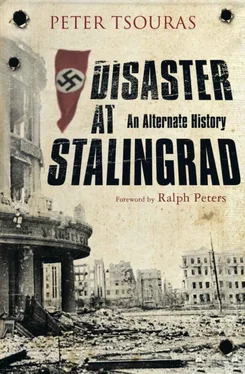German Embassy, Ankara, 15 April 1942
Franz von Papen, the German ambassador to the Republic of Turkey, had every reason to feel satisfied. General Emir Erkilet had just told him that ‘participation in the war against Russia would be very popular in the Army and in many sectors of the population’. 11The pro-German element in the Turkish Army was becoming more assertive, with encouragement coming from Berlin. Germany had been plying the Turks with reasons to enter the war on its side for over a year. Noted military historian John Gill observed,
In an especially well-received measure, the Führer wrote a personal letter to Turkish President Ismet Inönü recalling the comradeship of the First World War, the common interest in reducing British influence in the Mediterranean and the shared concerns about the USSR. These efforts culminated in a treaty of friendship signed by the unsuspecting Turks on 18 June 1941, only four days before the invasion of the Soviet Union. 12

MAP №1 THE PERSIAN CORRIDOR
The poorly equipped Turkish Army became the recipient of huge amounts of captured French and Soviet equipment, especially artillery and machine guns. German training teams were actively at work with the Turks to bring their army out of its World War I mindset into something vaguely resembling readiness for modern war. If the Turks were to join the Axis, they had to be prepared to contribute effectively.
Papen had assured the Turkish leadership that Turkey would have ‘a leading place in the Axis new order’, and that Germany would ensure that important ‘territorial rectifications’ would be made in Thrace, the Dodecanese Islands, northern Syria and Iraq all the way down to Mosul, and even in the Crimea. Especially attractive was the promise of Turkish territorial expansion into parts of the Caucasus inhabited by ethnic Turks, the Azeris, and even into Central Asia with its Turkic Uzbeks, Turkmen, Kazakhs and Kyrghiz. This had great appeal to the Pan-Turanism of important elements in Turkish society. 13
Probably the most important encouragement was a remarkable gesture by Hitler to transfer all of the Muslim prisoners captured from the Red Army, most of whom were of Turkic origin, to Turkey for ‘internment’. These numbered over a quarter million of the over three million Soviet POWs taken in the great encirclement battles of 1941. The gesture by Hitler had come about because of the visit to the Eastern Front at the height of the German rampage in 1941 by a group of senior Turkish officers arranged by Colonel Ali Fuat Erden. They were aware of the death by starvation that awaited Soviet POWs and pleaded with Hitler to spare their fellow Turkic Muslims. 14
Hitler had been impressed by the opportunities. He had looked upon the Turks positively as former allies from the First War but had come to see them in another light after the recent visit of an Arab delegation. The Arabs had told him that the Germans really should be Muslims because it fitted their nature better. He had not known much of Islam before this encounter but was now intrigued by it. He pondered the history of Europe and concluded that the defeat of the Arab invasion at Poitiers (Tours) in AD 732 had been a great lost opportunity for the Germans.
Had Charles Martel not been victorious at Poitiers — already, you see, the world had fallen into the hands of the Jews, so gutless a thing was Christianity! — then we should in all probability have been converted to Mohammedanism, that cult which glorifies heroism and which opens the seventh Heaven to the bold warrior alone. Then the Germanic races would have conquered the world. Christianity alone prevented them from doing that. 15
In his recorded dinner conversations he would constantly insult Christianity as making the Germans too weak and compassionate, but praise Islam as the only religion he could respect. Come the final victory there would be an end to the churches in Germany:
…all the confessions [denominations] are the same. Whichever one you choose, it will not have a future. [Italian] Fascism may in the name of God, make its peace with the Church. I will do that, too. Why not! It won’t stop me eradicating Christianity from Germany root and branch. You are either a Christian or a German. You can’t be both. 16
If Hitler looked upon the Soviet Muslims as useful auxiliaries in his war against Bolshevism, he would have nothing to do with anti-Soviet East Slavs — Russians, Ukrainians and Belorussians. Although he had millions of them in POW camps, very many of whom would have been glad to join the war against communism, he abhorred the idea of putting weapons in their hands. It was a justifiable conclusion given what he intended to do to them after his victory — those who survived were to be reduced to illiterate serfs of the Herrenvolk.
The German Army was far more practical and appreciated the possibilities these POWs presented. They had a leader ready-made in the captured Soviet general and war hero, Andrey Andreyevich Vlasov. He had been captured after his 2nd Shock Army had been cut off and destroyed in the fighting for Leningrad in early 1942. He surprised his captors by declaring that Stalin was the greatest enemy of the Russian people and stated his willingness to form an army to fight the communists. Hitler would only go so far as to allow the creation of a Russian Liberation Army, simply as a propaganda ploy. Vlasov would receive no troops to command, although a million Soviet citizens were taking up arms fighting for the Germans, but these were German Army controlled personnel. For Vlasov, a Russian patriot, there was only the bitter frustration of a priceless opportunity thrown away. 17
Hitler’s priorities were elsewhere. Thus, by early 1942, the last of the surviving Soviet Turkic and other Muslim POWs had been released into the custody of the Republic of Turkey. Goebbels brilliantly used this Nazi ‘humanitarian gesture’ to drive home pro-German sentiment in the Muslim world. It also had the effect of demoralizing the remaining Turkic troops in the Red Army and required the most brutal repression by the NKVD, which further alienated that part of the Soviet population. 18
The Germans expected that, if Turkey entered the war, it would put pressure on the British in Syria, Iraq, and Persia but put its main effort into an invasion of the Caucasus. The Germans as well asked for U-boat access to the Black Sea and for sole access to Turkish chromite ore, vital to German war industry.
Now if only the Turks would go along. The problem was that the Turkish leadership was split. The Army was increasingly for war; the President was unsure, and Prime Minister Sükrü Saracoglu favoured the West. All this time, the British had not been idle and were doing their best to keep Turkey neutral. In the face of this balance, ‘Hitler ordered preparation of a plan to rearrange the constellation of political power in Ankara to suit Berlin’s purposes better.’ 19
Stavka, Moscow, 25 April 1942
The logisticians on the Soviet General Staff were the most frightened of men. The reports they had to present to Stalin would have stunned a man with a lesser will or a more forgiving approach to failure than the Vozhd. 20Not that Stalin did not worry. He too was frightened, but he was patient and steady. He had panicked in the opening days of the German invasion when the shock had sent him to cower at his dacha outside Moscow for two weeks. When a delegation from the Politburo arrived, he thought they had come to arrest him. Instead they begged him to take the state in hand again. Since then his grip had not so much as quivered.
Читать дальше













